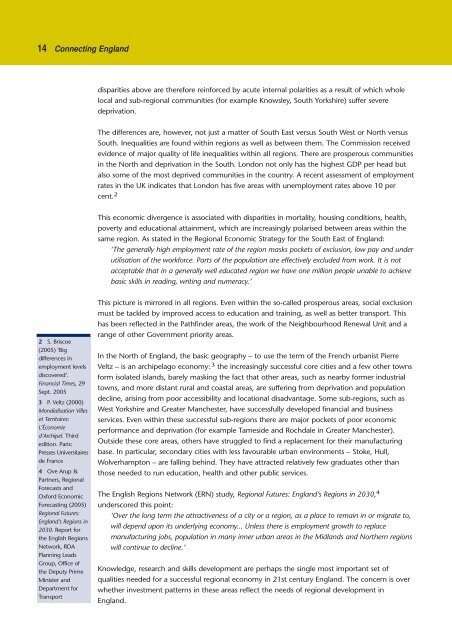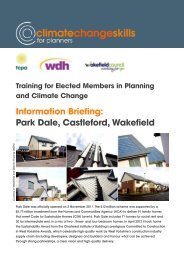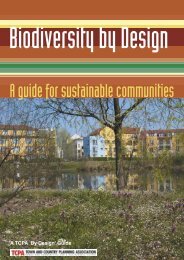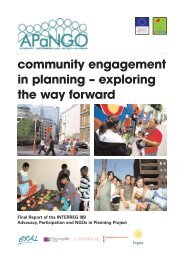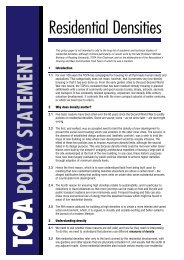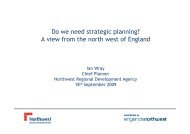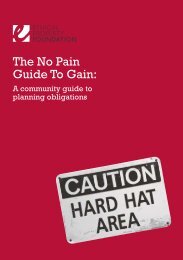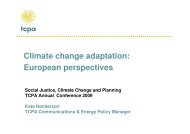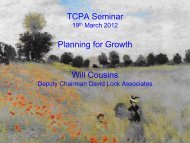Download Connecting England - Town and Country Planning ...
Download Connecting England - Town and Country Planning ...
Download Connecting England - Town and Country Planning ...
You also want an ePaper? Increase the reach of your titles
YUMPU automatically turns print PDFs into web optimized ePapers that Google loves.
14 <strong>Connecting</strong> <strong>Engl<strong>and</strong></strong>disparities above are therefore reinforced by acute internal polarities as a result of which wholelocal <strong>and</strong> sub-regional communities (for example Knowsley, South Yorkshire) suffer severedeprivation.The differences are, however, not just a matter of South East versus South West or North versusSouth. Inequalities are found within regions as well as between them. The Commission receivedevidence of major quality of life inequalities within all regions. There are prosperous communitiesin the North <strong>and</strong> deprivation in the South. London not only has the highest GDP per head butalso some of the most deprived communities in the country. A recent assessment of employmentrates in the UK indicates that London has five areas with unemployment rates above 10 percent. 2This economic divergence is associated with disparities in mortality, housing conditions, health,poverty <strong>and</strong> educational attainment, which are increasingly polarised between areas within thesame region. As stated in the Regional Economic Strategy for the South East of <strong>Engl<strong>and</strong></strong>:‘The generally high employment rate of the region masks pockets of exclusion, low pay <strong>and</strong> underutilisation of the workforce. Parts of the population are effectively excluded from work. It is notacceptable that in a generally well educated region we have one million people unable to achievebasic skills in reading, writing <strong>and</strong> numeracy.’2 S. Briscoe(2005) ‘Bigdifferences inemployment levelsdiscovered’.Financial Times, 29Sept. 20053 P. Veltz (2000)Mondialisation Villeset Territoires:L’Économied’Archipel. Thirdedition. Paris:Presses Universitairesde France4 Ove Arup &Partners, RegionalForecasts <strong>and</strong>Oxford EconomicForecasting (2005)Regional Futures:<strong>Engl<strong>and</strong></strong>’s Regions in2030. Report forthe English RegionsNetwork, RDA<strong>Planning</strong> LeadsGroup, Office ofthe Deputy PrimeMinister <strong>and</strong>Department forTransportThis picture is mirrored in all regions. Even within the so-called prosperous areas, social exclusionmust be tackled by improved access to education <strong>and</strong> training, as well as better transport. Thishas been reflected in the Pathfinder areas, the work of the Neighbourhood Renewal Unit <strong>and</strong> arange of other Government priority areas.In the North of <strong>Engl<strong>and</strong></strong>, the basic geography – to use the term of the French urbanist PierreVeltz – is an archipelago economy: 3 the increasingly successful core cities <strong>and</strong> a few other townsform isolated isl<strong>and</strong>s, barely masking the fact that other areas, such as nearby former industrialtowns, <strong>and</strong> more distant rural <strong>and</strong> coastal areas, are suffering from deprivation <strong>and</strong> populationdecline, arising from poor accessibility <strong>and</strong> locational disadvantage. Some sub-regions, such asWest Yorkshire <strong>and</strong> Greater Manchester, have successfully developed financial <strong>and</strong> businessservices. Even within these successful sub-regions there are major pockets of poor economicperformance <strong>and</strong> deprivation (for example Tameside <strong>and</strong> Rochdale in Greater Manchester).Outside these core areas, others have struggled to find a replacement for their manufacturingbase. In particular, secondary cities with less favourable urban environments – Stoke, Hull,Wolverhampton – are falling behind. They have attracted relatively few graduates other thanthose needed to run education, health <strong>and</strong> other public services.The English Regions Network (ERN) study, Regional Futures: <strong>Engl<strong>and</strong></strong>’s Regions in 2030, 4underscored this point:‘Over the long term the attractiveness of a city or a region, as a place to remain in or migrate to,will depend upon its underlying economy... Unless there is employment growth to replacemanufacturing jobs, population in many inner urban areas in the Midl<strong>and</strong>s <strong>and</strong> Northern regionswill continue to decline.’Knowledge, research <strong>and</strong> skills development are perhaps the single most important set ofqualities needed for a successful regional economy in 21st century <strong>Engl<strong>and</strong></strong>. The concern is overwhether investment patterns in these areas reflect the needs of regional development in<strong>Engl<strong>and</strong></strong>.


